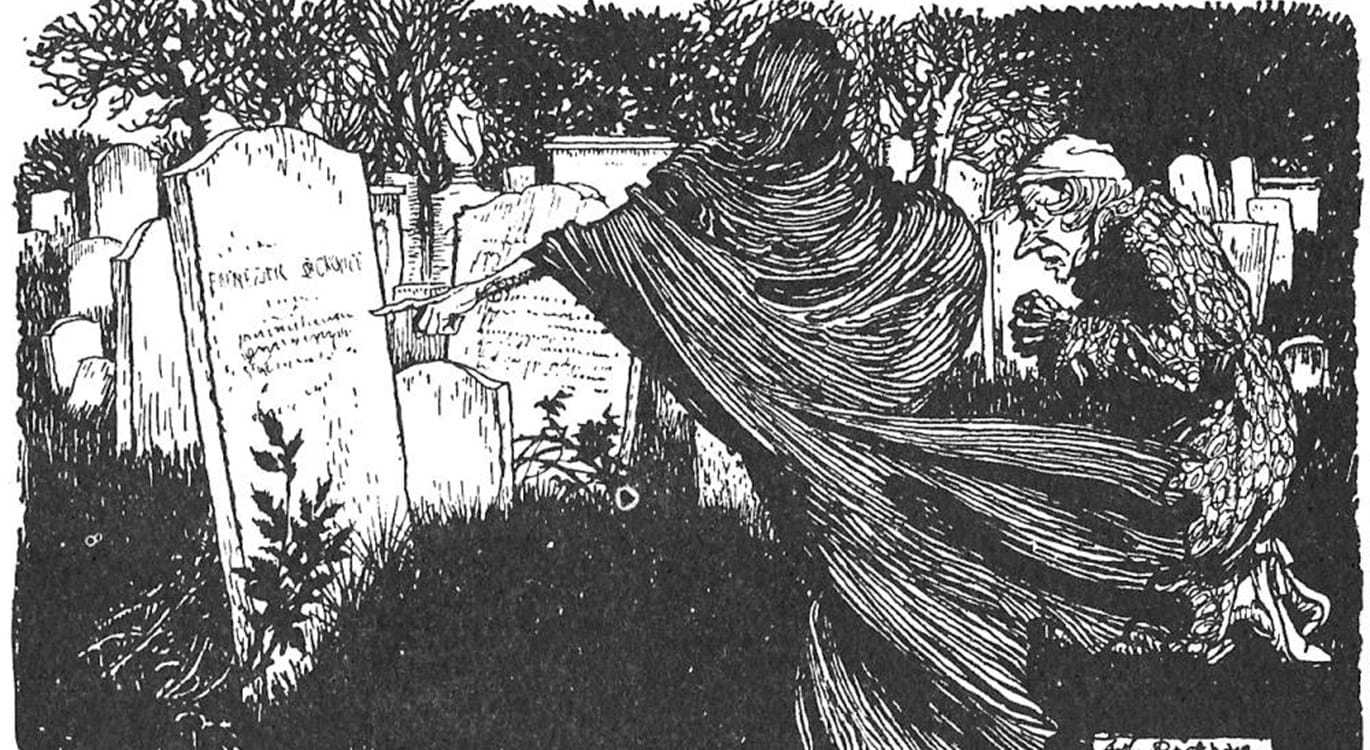The story tells of the lonely miser, Ebenezer Scrooge – “Bah, humbug!” – who, one Christmas Eve, is visited by several spirits aiming to teach old Scrooge some important lessons. To his credit, Scrooge takes these lessons to heart and the final stanza of the carol shows us a man transformed in relation to his love; and saved in relation to his life.
The enduring power of this story is found in the hope it gives to all of us, for I believe we are all more like Scrooge than we’d care to admit. Oh, we may not be as miserly or greedy for gain as Scrooge was, but deep down we know how selfish we are. So often our lives only revolve around a few earthly loves – idols, we might call them – whether people, pleasure, or property, and having devoted ourselves to any of these, we can come away feeling empty and alone, knowing something is missing. In this classic tale, we therefore step into Scrooge’s shoes to learn the lessons with him and find that missing ingredient.
Lesson 1 – Christmas Past
The first of the three spirits take Scrooge back in time to review the heart journey of a young Ebenezer through school and apprenticeship and into courtship. This review reveals a downward trajectory into selfishness that truly manifests itself in the rejection of one who loves him.
In the book, the girl to whom Ebenezer Scrooge is engaged is unnamed – an imperfect figure, could I suggest, of God’s love toward us, manifested in this, “that God has sent His only begotten Son into the world, that we might live through Him” (1 John 4:9). As this girl speaks to Scrooge, do her words not cut through any pretence that hangs over our own hearts, and convict us as guilty of spurning God’s love for other idols of our own choosing?
“It matters little,” she said, softly. “To you, very little. Another idol has displaced me; and if it can cheer and comfort you in time to come, as I have tried to do, I have no just cause to grieve . . . I have seen your nobler aspirations fall off one by one, until the master-passion, Gain, engrosses you. Have I not.” (Charles Dickens, 1843).
The truth is that nothing “can cheer and comfort” us like the Lord Jesus can. He has come to us just as “He came to His own”. “His own did not receive Him” (John 1:11). Have you received Him? Or has another idol displaced Him? The Bible is clear, repeating in both Old and New Testaments that first and foremost we are to “love the LORD your God with all your heart, with all your soul, with all your mind, and with all your strength” (Mark 12:30).
What is your master-passion? What is mine? If it is not Christ, then we are simply selfish sinners, just like Scrooge. I trust we can also be like Scrooge in acknowledging the truth of this lesson.
Lesson 2 – Christmas Present
In this central stanza, Ebenezer Scrooge is taken to consider something of the joy of Christmas. A central figure in this section is Tiny Tim, youngest son of Bob Cratchit (Scrooge’s clerk) who, despite being lame, is filled with such simple joy and generosity that it touches Scrooge’s hardened heart deeply. He hangs his head in shame as he realises that all his wealth is worth nothing “in the sight of Heaven” compared to the simple faith of “this poor man’s child”.
We learn of the object of this faith when, arriving home from church on Christmas Day, Bob Cratchit shares with the family how that Tiny Tim “hoped the people saw him in the church, because he was a cripple, and it might be pleasant to them to remember upon Christmas Day, who made lame beggars walk, and blind men see” (Dickens).
This is almost a throwaway comment in the story, and easily missed, yet it is the most important lesson in the whole story, so let me highlight it for you in simple terms – focus on Jesus Christ this Christmas. He is that missing ingredient, and yet, how often do we retell the Christmas story or sing the carols, and it never touches our hardened hearts. Perhaps we need to revisit the wonders of that first Christmas in the spirit of Tiny Tim, and listen afresh to the words of the angel to those lowly shepherds:
“Do not be afraid, for behold, I bring you good tidings of great joy which will be to all people. For there is born to you this day in the city of David a Saviour, who is Christ the Lord” (Luke 2:10,11).
This declaration tells us that the baby born that day, Jesus, was not just another baby boy. The angel is telling the shepherds, and us, that this One who is born is none other than “God [our] Saviour” (Luke 1:47) who has become man, anointed in fulfilment of the Messiah’s prophesied mission to which Tiny Tim alluded: “to heal the brokenhearted, to proclaim liberty to the captives and recovery of sight to the blind, to set at liberty those who are oppressed” (Luke 4:18). These are wonderful truths to remember, but even more wonderful is the fact that for this healing to be accomplished, and for the cause of the misery, sin, to be rooted out, it was needful for Jesus Christ to go to the cross, where “He was wounded for our transgressions, He was bruised for our iniquities; the chastisement for our peace was upon Him, and by His stripes we are healed” (Isaiah 53:5).
How can we forget Christ at Christmas? How can we not be touched by the depths of His love for us? How can we continue to pursue other loves; idols that have no power to save us? If we are not willing to be changed by Christ’s sacrifice for us, if we continue as we are, then we must take heed of this next lesson.
Lesson 3 – Christmas Future
This final lesson for Ebenezer Scrooge, as it is for us, is simple yet stark – Death is Coming!
And yet, as dreadful as it is to lose your life, the Bible would make clear that there is a more terrible event that looms large on the horizon: “It is appointed for men to die once, but after this the judgment” (Hebrews 9:27).
What good then the idols of our youth: friends, fun, family, fame or fortune? Can they save us from the wrath of God? Can they take us from the path that leads to destruction, and give us eternal life?
For Scrooge, upon seeing the certain hopeless end of the path he’d chosen and feeling the convicting finger point “from the grave to him, and back again”, he uttered a cry of repentance and pleaded for some hope of salvation: “‘hear me! I am not the man I was’ . . . For the first time the hand appeared to shake . . . ‘Assure me that I yet may change these shadows you have shown me, by an altered life!’” (Dickens).
Sadly, Ebenezer Scrooge doesn’t get any positive assurance to this end, though the final stanza of the carol shows Scrooge a changed man and intimates that, as he changed, so his end would change.
As for us, we have a certain hope. God’s Word assures us “that if you confess with your mouth the Lord Jesus and believe in your heart that God has raised Him from the dead, you will be saved” (Romans 10:9).
Photo credit: Arthur Rackham (1915) https://commons.wikimedia.org/



